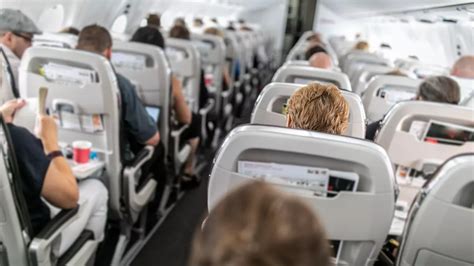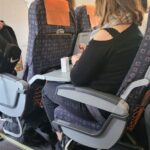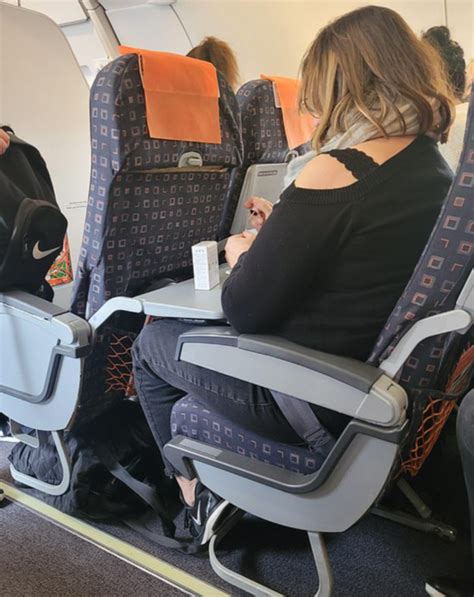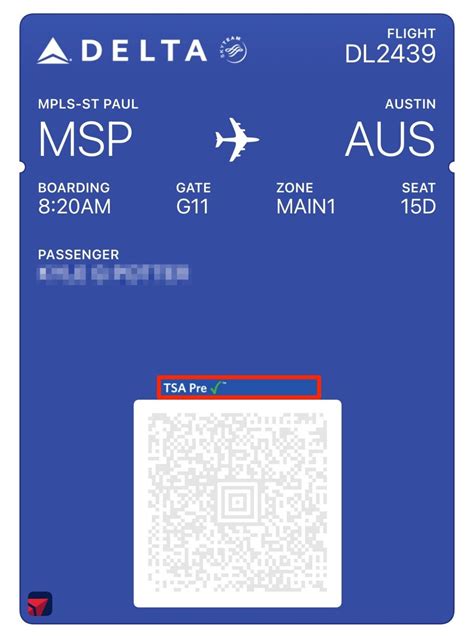
A travel influencer is facing backlash after sharing a “comfy” flight hack that involved placing an inflatable footrest in the airplane aisle, sparking debate about etiquette and personal space on flights. The influencer, known as @travelwithmel_, showcased the setup in a now-viral video, prompting criticism from viewers who deemed the practice inconsiderate and potentially hazardous.
A viral video posted by travel influencer @travelwithmel_, showing her using an inflatable footrest to create a makeshift bed in the aisle of an airplane, has ignited a firestorm of controversy, with many viewers accusing her of being rude and inconsiderate of other passengers. The influencer, who often shares travel tips and tricks with her followers, has been met with a barrage of negative comments since posting the video, which has garnered millions of views. Critics argue that the footrest obstructs the aisle, posing a tripping hazard and hindering other passengers’ ability to move freely during the flight.
The video, originally posted to TikTok and subsequently shared on other social media platforms, shows @travelwithmel_ comfortably situated in her seat, with her legs extended onto the inflatable footrest, effectively creating a flat surface that allowed her to stretch out. While the influencer seemingly intended to share a helpful tip for achieving comfort during long flights, the reception has been overwhelmingly negative. Many commenters have pointed out the potential safety risks and the disruption caused to fellow travelers.
“Is it just me or is this rude? I would be fuming if I was on that flight,” one commenter wrote, encapsulating the general sentiment expressed across social media. The debate surrounding the influencer’s “hack” highlights the growing tension between individual comfort and shared space in the increasingly cramped confines of modern air travel.
The incident has reignited the discussion about airline passenger etiquette, with many calling for clearer guidelines and enforcement of rules regarding personal space and obstructions in the aisle. Several viewers tagged airlines in their comments, urging them to address the issue and prevent similar situations from occurring in the future. Some even suggested that airlines should explicitly prohibit the use of inflatable footrests or other devices that could impede passenger movement or create safety hazards.
The controversy surrounding @travelwithmel_’s flight hack underscores the delicate balance between individual comfort and the consideration of others in shared public spaces. As air travel becomes increasingly common and passenger density continues to rise, the debate over etiquette and personal boundaries is likely to intensify. This incident serves as a reminder of the importance of respecting fellow travelers and adhering to established rules and guidelines designed to ensure a safe and comfortable journey for everyone. The uproar highlights the power of social media to amplify concerns and hold individuals accountable for their actions, particularly when those actions are perceived as inconsiderate or disruptive. The influencer has yet to publicly address the controversy or respond to the numerous criticisms leveled against her. It remains to be seen whether airlines will take action to address the use of inflatable footrests and other similar devices on flights.
The unfolding situation raises pertinent questions about the evolving norms of air travel and the responsibilities of both passengers and airlines in maintaining a comfortable and safe environment for all. While some may view the influencer’s actions as a harmless attempt to improve her own comfort, others see it as a blatant disregard for the well-being and convenience of her fellow travelers. This difference in perspective underscores the complexity of the issue and the need for a more nuanced understanding of passenger etiquette in the context of modern air travel.
In-Depth Analysis:
The controversy surrounding @travelwithmel_’s “comfy” flight hack goes beyond a simple question of etiquette. It touches upon broader issues related to the economics of air travel, the shrinking personal space afforded to passengers, and the increasing prevalence of social media influencing. Airlines, in their pursuit of maximizing profits, have steadily reduced legroom and personal space, leading passengers to seek out creative solutions to enhance their comfort during flights. This has, in turn, created a tension between those who prioritize their own comfort and those who believe that such efforts infringe upon the rights of other passengers.
The rise of social media influencers has further complicated the issue. Influencers often promote products and practices that may not be widely accepted or may even be considered controversial. In this case, @travelwithmel_ likely intended to generate engagement and promote the inflatable footrest as a travel essential. However, the backlash she received demonstrates the potential pitfalls of promoting practices that are perceived as selfish or inconsiderate.
The incident also raises questions about the role of airlines in regulating passenger behavior. While airlines have rules and regulations regarding safety and security, they often lack clear guidelines regarding personal space and etiquette. This ambiguity can lead to confusion and conflict among passengers. Some argue that airlines should take a more proactive role in defining and enforcing standards of behavior to ensure a more comfortable and respectful environment for all travelers.
Furthermore, the controversy highlights the impact of social media on public perception. The viral nature of the video and the widespread condemnation of the influencer’s actions demonstrate the power of social media to shape opinions and hold individuals accountable. This can be both a positive and a negative force. On the one hand, it can help to promote responsible behavior and discourage actions that harm or inconvenience others. On the other hand, it can lead to online shaming and the disproportionate punishment of individuals for relatively minor offenses.
The debate sparked by @travelwithmel_’s flight hack is likely to continue, as the issues it raises are complex and multifaceted. Ultimately, finding a solution will require a collaborative effort between passengers, airlines, and social media platforms. Passengers need to be mindful of their impact on others and adhere to established rules and guidelines. Airlines need to provide clear and consistent standards of behavior and enforce them fairly. And social media platforms need to promote responsible content creation and discourage the spread of misinformation and harmful content.
Background Information:
The issue of airline passenger etiquette has been a recurring topic of debate for years, with numerous articles and online forums dedicated to discussing acceptable and unacceptable behavior on flights. Some common complaints include reclining seats too far back, taking up too much armrest space, and engaging in loud or disruptive conversations.
In recent years, the shrinking size of airplane seats and the increasing density of passengers have exacerbated these tensions. As airlines pack more people into smaller spaces, passengers are feeling increasingly cramped and uncomfortable, leading to heightened levels of stress and frustration.
The rise of social media has further amplified these issues, as passengers are now more likely to document and share instances of perceived rudeness or inconsiderate behavior. This can lead to online shaming and public shaming, which can have significant consequences for the individuals involved.
Airlines have attempted to address some of these issues by implementing new rules and guidelines regarding passenger behavior. For example, some airlines have banned the use of devices that block seats or restrict legroom. However, these efforts have often been met with mixed reactions, as some passengers feel that they are too restrictive, while others believe that they do not go far enough.
The debate over airline passenger etiquette is likely to continue, as the underlying issues of space, comfort, and respect remain unresolved. Finding a solution will require a combination of individual responsibility, airline regulation, and social awareness.
Expanded Context:
Beyond the immediate controversy, the incident highlights several broader trends in air travel and social media culture. One is the increasing pressure to “hack” every aspect of life, from travel to productivity, in the pursuit of optimization and efficiency. While some hacks are genuinely helpful, others, like the inflatable footrest, can be seen as prioritizing individual gain at the expense of collective well-being.
Another trend is the blurring of lines between personal and public space. Social media encourages individuals to share intimate details of their lives, often without considering the potential consequences. In this case, @travelwithmel_ may have viewed her flight hack as a harmless tip to share with her followers, but she failed to anticipate the negative reaction it would provoke.
The incident also raises questions about the responsibility of influencers. As individuals with a large and engaged audience, influencers have a significant impact on the behavior and attitudes of their followers. They have a responsibility to promote ethical and responsible practices, and to avoid endorsing actions that could harm or inconvenience others.
Finally, the controversy underscores the importance of empathy and consideration in a world that is increasingly polarized and divided. As air travel becomes more crowded and stressful, it is more important than ever to be mindful of the needs and feelings of others. Simple acts of kindness and consideration can go a long way in making the travel experience more pleasant for everyone.
Detailed Breakdown of Issues:
-
Aisle Obstruction: The primary concern revolves around the inflatable footrest physically blocking the aisle. Airplane aisles are designed for safe passage during boarding, deplaning, and, most importantly, in case of emergency. An obstruction, regardless of how comfortable it makes one passenger, compromises the safety and accessibility for everyone else on board. Emergency exits need to be readily accessible, and flight attendants require unobstructed pathways to perform their duties, including assisting passengers in need. The footrest essentially shrinks the already limited space, forcing other passengers to navigate around it, increasing the risk of trips, falls, and injuries.
-
Personal Space and Entitlement: The act of extending one’s legs into the aisle is perceived as an encroachment on shared space. Airplane travel is often uncomfortable due to limited legroom and personal space. While passengers may sympathize with the desire for comfort, the influencer’s solution is viewed as an attempt to unilaterally expand her personal space at the expense of others. This perceived sense of entitlement contributes to the negative reaction. Many view this as a case of prioritizing individual comfort above the collective well-being and convenience of other passengers.
-
Safety Concerns: Beyond the immediate tripping hazard, the footrest also raises broader safety concerns. In the event of turbulence or an emergency, an object in the aisle could become a projectile, causing injury. Furthermore, it could impede the evacuation process, as passengers would need to navigate around the obstruction in a potentially chaotic and stressful situation. The use of such devices could also hinder the movement of emergency personnel trying to reach passengers in need.
-
Airline Regulations: Most airlines have rules and regulations regarding carry-on items and aisle obstructions. While the specific wording may vary, the general intent is to ensure passenger safety and comfort. The influencer’s use of the inflatable footrest likely violates these regulations, although enforcement may be inconsistent. This incident raises questions about the need for clearer and more consistently enforced rules regarding the use of such devices. It also highlights the challenge for airlines in balancing the desire to provide a comfortable travel experience with the need to maintain safety and order.
-
Social Media Influence and Responsibility: As a travel influencer, @travelwithmel_ has a responsibility to promote ethical and responsible travel practices. By showcasing a “hack” that is widely perceived as rude and inconsiderate, she potentially encourages her followers to engage in similar behavior. This raises questions about the ethical obligations of influencers and the potential consequences of promoting practices that prioritize individual gain over collective well-being. The incident serves as a reminder that influencers have a significant impact on their audience and should be mindful of the messages they are sending.
-
Economic Factors and Airline Practices: The incident is indirectly related to the economic pressures facing airlines. In their efforts to maximize profits, airlines have reduced legroom and personal space, leading passengers to seek out creative solutions to enhance their comfort. This has created a tension between those who prioritize their own comfort and those who believe that such efforts infringe upon the rights of other passengers. The incident highlights the need for airlines to address the underlying issue of limited space and to find ways to provide a more comfortable travel experience without compromising safety or convenience.
-
Cultural Norms and Etiquette: The debate also touches upon cultural norms and expectations regarding public behavior. What is considered acceptable in one culture may be considered rude or inconsiderate in another. The incident highlights the importance of being aware of cultural differences and of adhering to generally accepted standards of etiquette when traveling. It also raises questions about the role of social media in shaping and reinforcing these norms.
Preventative Measures and Solutions:
-
Clearer Airline Policies: Airlines should establish clear and specific policies regarding the use of inflatable footrests and other devices that could obstruct the aisle or infringe upon the personal space of other passengers. These policies should be clearly communicated to passengers during the booking process and before boarding.
-
Consistent Enforcement: Airlines should consistently enforce their policies regarding aisle obstructions. Flight attendants should be trained to identify and address potential violations of these policies.
-
Passenger Education: Airlines should educate passengers about acceptable and unacceptable behavior on flights. This could include providing information on etiquette and personal space during the booking process and before boarding.
-
Product Redesign: Manufacturers of travel accessories could redesign inflatable footrests and other similar devices to be less intrusive and more considerate of other passengers.
-
Social Media Awareness: Social media platforms should promote responsible content creation and discourage the spread of misinformation and harmful content. Influencers should be encouraged to promote ethical and responsible travel practices.
-
Promote Empathy and Consideration: Travelers should be encouraged to be mindful of the needs and feelings of others and to act with empathy and consideration. Simple acts of kindness and consideration can go a long way in making the travel experience more pleasant for everyone.
-
Dialogue and Discussion: Encourage open dialogue and discussion about airline passenger etiquette to foster a greater understanding of different perspectives and to promote a more respectful and considerate travel environment.
Frequently Asked Questions (FAQs):
1. What exactly did the influencer do that caused the controversy?
The travel influencer, @travelwithmel_, posted a video demonstrating a “comfy” flight hack involving an inflatable footrest that she placed in the airplane aisle. This allowed her to stretch her legs and create a makeshift bed, but it also obstructed the aisle and sparked outrage from viewers who considered it rude and potentially dangerous.
2. Why are people so upset about the influencer’s flight hack?
The primary reasons for the outrage include the aisle obstruction, which poses a tripping hazard and impedes emergency egress; the encroachment on other passengers’ personal space; potential violations of airline regulations; and the irresponsible promotion of inconsiderate behavior by a social media influencer. Many feel it prioritizes individual comfort over the safety and convenience of fellow travelers.
3. What have airlines said about the use of inflatable footrests on flights?
Currently, most airlines do not have a specific policy prohibiting inflatable footrests. However, general rules about aisle obstructions and carry-on items likely apply. This incident is prompting calls for airlines to clarify their policies and enforce them more consistently to ensure passenger safety and comfort. Many passengers are now asking airlines to explicitly ban such devices.
4. What responsibility do social media influencers have when sharing travel tips?
Social media influencers have a significant responsibility to promote ethical and responsible travel practices. They should consider the potential consequences of their actions and avoid endorsing behaviors that could harm or inconvenience others. In this case, the influencer is being criticized for promoting a “hack” that is widely perceived as rude and inconsiderate. They should prioritize the well-being of the community over personal gain or engagement.
5. What can be done to prevent similar situations from happening in the future?
To prevent similar situations, airlines can establish clearer policies regarding aisle obstructions, enforce these policies consistently, and educate passengers about acceptable behavior. Travel accessory manufacturers could redesign their products to be less intrusive. Social media platforms and influencers should promote responsible content. Most importantly, travelers should exercise empathy and consideration for others. Dialogue and discussions about airline passenger etiquette can also foster a more respectful and considerate travel environment.


![Browns QB Shakeup: [QB Name] Takes Lead at Minicamp!](https://jelajahtekno.com/wp-content/uploads/2025/06/unnamed-file-609-150x150.jpg)






